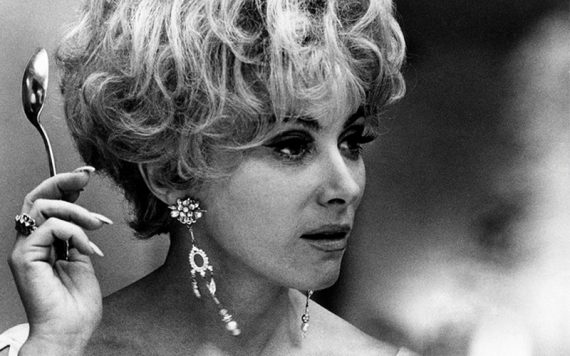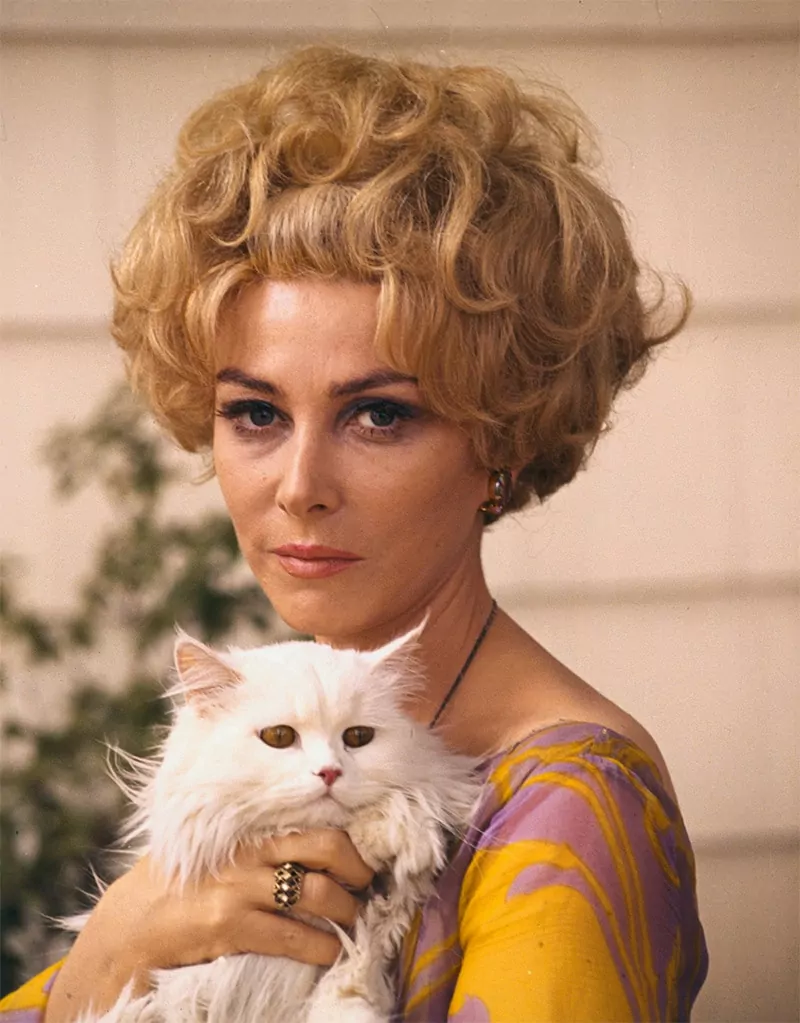Legendary Actress and Film Director Lee Grant Talks the Hollywood Blacklist and Biggest Career Accomplishments

While still in her teens, Lee Grant established herself as a formidable Broadway talent, winning the Critics Circle Award for her performance as the shoplifter in Detective Story. She recreated this portrayal on film, garnering the Cannes Film Festival award for Best Actress, her first Academy Award nomination and an invitation into the prestigious Actors Studio.
Ms. Grant’s impressive film debut was cut short by the McCarthy Era entertainment industry blacklist. After 12 years, she resumed a stunning film career, beginning with a 1966 Emmy Award for Peyton Place and culminating with a 1976 Academy Award for Shampoo. During this time, she also received much attention for her riveting performance in the 1967 Academy Award winning picture In the Heat of the Night, another Emmy Award for the Neon Ceiling and Academy Award nominations for The Landlord and Voyage of the Damned.
Ms. Grant remained involved with creative, innovative theater on both the east and west coasts. She won the 1964 Obie Award for The Maids. She performed at the New York Shakespeare Festival as Electra on PBS’s Theater in America series; as Arkadina in The Seagull; on Broadway in Neil Simon’s Prisoner of Second Avenue and his film Plaza Suite; and at the Williamstown Playhouse. She opened the Geffen Playhouse in Los Angeles in the The Little Foxes, and helped to establish the Actors Studio West.
In 1974, Ms. Grant was accepted as a student director in the first Women’s Project at the American Film Institute. Her adaptation of Strindberg’s The Stronger (1976) still stands as one of the 10 best films ever produced for AFI. She went on to direct her first feature film, the critically acclaimed Tell Me a Riddle (1980), as well as her first documentary, The Willmar 8 (1981).
Since 1980, Ms. Grant has concentrated on her directorial efforts. She and her husband Joseph Feury launched an independent production company in 1982 and have since produced a number of award winning films. Their credits include five documentaries, made for HBO’s “America Undercover” series. “Battered” looked at the issue of domestic violence, while the episode “When Women Kill” profiled women serving prison sentences for homicide convictions. Similarly, “Women on Trial” examined court custody battles. Her documentary What Sex Am I? (1985) explored transvestite and transsexual lifestyles. Down and Out in America (1986) examined homelessness throughout the country and garnered both an Academy Award and a Cable Ace Award in 1986.
Of the company’s made-for-television movies, Ms. Grant received the 1987 Directors Guild Award for the CBS film Nobody’s Child (1986) and the 1989 FIPA D’Argent at the Cannes International Television Festival for No Place Like Home, also on CBS. In 1994, she directed three more television movies—Seasons of the Heart and Reunion for CBS, and Following Her Heart for NBC. Ms. Grant also returned to the screen as an actress, working on network television and in the feature films Defending Your Life (1991) and It’s My Party (1996).
In 1983, she received the Congressional Arts Caucus Award for outstanding achievement in acting and independent filmmaking. In 1984, she received a New York Drama Critics Award nomination for her direction of Vaclav Havel’s A Private View at the Public Theater. In 1989, Women in Film paid tribute to Ms. Grant with their first ever Lifetime Achievement Award. In 1990, both the New York City Council and the County of Los Angeles Board of Supervisors recognized her for the contribution her films have made to the fight against domestic violence.
Her documentary, Say It, Fight It, Cure It, about breast cancer aired on Lifetime Television in October 1997. The following month, Ms. Grant received another Lifetime Achievement Award, with a retrospective screening of her acting and directorial work, at the celebrated Hamptons International Film Festival.
Ms. Grant has directed several episodes of Intimate Portrait for Lifetime Television; among them Vanessa Redgrave, Lauren Bacall, Mia Farrow, Tipper Gore, Elizabeth Taylor and Gloria Steinem—Lifetime’s 100th portrait. Ms. Grant received a Gilda Award for her episode on Madeline Kahn, and “Intimate Portrait” Bella Abzug was the recipient of a Gracie Award. Ms. Grant directed the documentary Confronting the Crisis: Childcare in America, which aired on Lifetime in April 1999.
In the year 2000, Ms. Grant was lured back to the screen by the opportunity to work with director Robert Altman in Dr. T. & the Women.
Ms. Grant directed the documentaries The Gun Deadlock (2001) for Lifetime Television and a PBS “American Masters” on Sidney Poitier in 2001. In 2006, she directed an HBO documentary on Kirk and Michael Douglas, …A Father… A Son… Once Upon a Time in Hollywood.
Ms. Grant, with husband Joe Feury, produced a critically acclaimed documentary on medics and the wounded in Iraq, “Baghdad ER”, which was released in 2006 on HBO and won the Emmy and the Peabody Award and several others.
Her memoir, I Said Yes To Everything: A Memoir was published in June 2014.
I want to start off just talking a little bit about the blacklist, and your refusal to name names. Can you talk to me a little bit about your decision to do that, and if you ever second guessed yourself?
Lee Grant: No. It was never even a dot on the horizon. The whole idea of turning in somebody, so you could work … is so … repellent. I said I would have to be put in an insane asylum for the rest of my life if I named my husband. That’s the pay off for me.
If I did such a thing, and knew, and lived with it. I had a career of acting because I turned in, the person I was married to. Why go on? Act in what? The whole concept was so ugly and so revolting. Revolting. I never, ever, ever, had a problem with saying, “Uh oh, this is the way it is now.”
But, you know, I’m a New Yorker. I’m here in New York, and the theater was free. The theater never had a blacklist. So, I went from one play, maybe a next year I didn’t get a play, the year after that I did. You know, but we were cocooned here in a way, bcause, actors and the producers on Broadway, had an agreement never to have a blacklist in the theater.
As a matter of fact, I was in a play when I got the call to go to Washington, and to appear in front of the committee. I went to my producer, and said, “Look, I understand. I’m going to take the fifth amendment there. I’m not going to answer any of their questions, so I understand if you have a problem and you need to replace me.” He said, “You just go. You do what you have to do, and come back. There’s a place for you. There’s a home for you always.” You know, I felt embraced by the people in the theater.
After twelve years of not being in Hollywood, and then coming back to Hollywood, how did that affect you? Making that transition, kind of back into that world.
Lee Grant: It was like going into another planet. It really was. First of all, I went into the biggest show on television, that was on three times a week with new shows. Three times a week. The whole country watched Peyton Place.
You know, Mia, and Ryan O’Neal, Barbara Parkins, these were idols at the time, that I went into it. I could not have come from a more obscure place in New York, to a more showplace, in California. I mean, it was so astonishing. You know, I still carried the fear of being discovered, that the FBI was still after me. You know, you don’t lose those things after living it for 12 years.
I was nominated for an Emmy, that first season on “Peyton Place”. You know, it was just too scary to go from ignominy, in New York, to this glory in Hollywood. It was too much for me to even grasp. It was, you know, delicious and funny. Of course, my daughter Dina, was eight at the time, and we started our family all over again. It was great.
Looking back at your career, what do you feel for you is your biggest accomplishment? What are you the most proud of?
Lee Grant: Well, I made a four minute piece called, “Battered”, about the Trump/Hillary campaign. In which, I feel this is modern battering. You can find it and watch it. It’s only four minutes.
(You can take a look at the film below)
Read the full feature on Lee Grant at our sister site Women’s Business Daily!
And see Lee Grant in Landlord tonight (11/28/17) on TCM! And head on over to FilmStruck for all your classic movie needs!




Responses